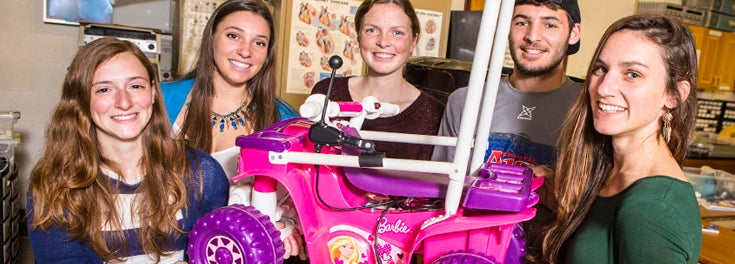
For many kids, zipping around the neighborhood in a motorized toy car is the height of fun. Unfortunately, this is not the case for children with limited mobility: The cars are too hard to control.
Students at the University of Rhode Island are using their brains—and compassion—to change that. Physical therapy and biomedical engineering students are teaming up to modify toy Range Rovers and Mario Go-Karts to make them easier to drive.
It shows how engineering technology can benefit the community and children with disabilities. We’re very proud that our students, at the beginning of their careers, are working on such a meaningful program.
A few months ago, Sandra Maliangos and Coral Hines—both getting their doctorates in physical therapy—read about Go Baby Go, a program at the University of Delaware that refits cars for children. They decided to launch a similar program in Rhode Island for their leadership project—and Lil’ Rhody Riders was born. Their two challenges were securing the funds to buy the cars and finding engineering expertise.
First, they started a crowdfunding site, quickly raising enough to buy cars for several kids. Then they sent a query to the students who, as they jokingly put it, “rewire things’’ on campus: Anyone want to tinker with a Barbie jeep? The response was overwhelming. Biomedical engineering students Katie Brown, Zach Campo, and Cara Nunez signed up.
In the “garage,” a cavernous classroom on the second floor of Kelly Hall, the cars are being altered to meet the needs of each child, most of whom have cerebral palsy, fibrosarcoma, and other conditions that limit mobility. Railings on a seat keep a child’s head upright. For children who have trouble using their feet, a button on a steering wheel replaces a gas pedal. And newly installed ultrasound sensors shut off a car if it gets too close to a wall.
“This project is a wonderful marriage of two URI departments,’’ says Ying Sun, biomedical engineering professor. “It shows how engineering technology can benefit the community and children with disabilities. We’re very proud that our students, at the beginning of their careers, are working on such a meaningful program.’’
Boosting a child’s self-esteem is the goal. The cars allow the children to do what their peers are doing and to be more independent. “When you’re a toddler, feeling like you’re in control is important,’’ says Coral. “These cars empower them with confidence—where they go, who they play with.’’
Parents found out about Lil’ Rhody Riders through word of mouth and the program’s Facebook page. Tara Dunne says the car will change her 2-year-old daughter’s life. Kate’s cerebral palsy limits movement of her arms and legs. She can’t walk or crawl. Playing inside with friends is manageable, but in the outdoors she feels left out.
“If people are running around outside she can’t participate,’’ says Dunne, who added that Kate loves anything that goes vroom. “It will be really cool for her to get in on the fun, and not have her mom pushing her around any more.’’
